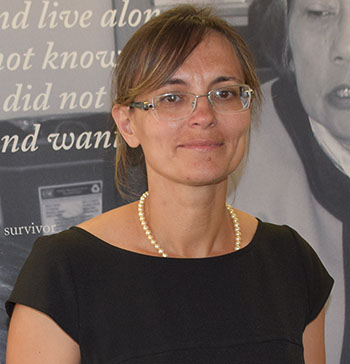
Svetlana Ushakova
While her fellow indexers focused on mainly English-language testimonies in USC Shoah Foundation’s new collection from Jewish Family and Children’s Services (JFCS) of San Francisco, Svetlana Ushakova indexed testimonies of Holocaust survivors from her native Russia – who at times felt like her own friends.
With a PhD in Russian History from Novosibirsk University, Ushakova joined the JFCS collection with expertise in pre-war Soviet history, though she had not worked very closely with oral history testimonies before.
USC Shoah Foundation’s indexing system allows users of the Visual History Archive to use 62,882 keywords and nearly 1.8 million names to search the archive’s 52,000 testimonies down to the minute. Typically, staff who are hired to index new collections have backgrounds in history, languages and/or library science and cataloging. Their job entails cataloging each testimony according to the interviewee's biographical information, and deciding which keywords most accurately describe what the interviewee is talking about in each minute of the testimony.
A small group of staff was hired in January 2014 to index the newly-acquired JFCS collection. After an initial training session on-site at USC Shoah Foundation’s office in Los Angeles, the indexers continued working full-time from home, using USC Shoah Foundation’s indexing software to each complete several hours of testimony per week.
Ushakova worked on Russian-language testimonies as well as some English-language testimonies. She was surprised to find that the Russian testimonies were actually the hardest for her to index, since the experiences of these survivors are some of the most heart-wrenching and tragic to listen to. She also felt a personal connection to many of these survivors.
“It was challenge for me psychologically because they feel especially close to me because I understand the history, the situation,” Ushakova said. “It’s almost like my friends because they are close to me.”
Although as a researcher she prefers to search through materials herself, using her own methodology, Ushakova said she understands that with a collection this size, that is not possible for most scholars, so she appreciates the impact her indexing will have on others.
In fact, Ushakova’s work as an indexer is not done yet. With the JFCS indexing now complete, Ushakova will begin indexing USC Shoah Foundation’s new collections from Canada. She said the knowledge she has gained form the JFCS testimonies will be very helpful for her work on the next collection, and she’s grateful to have the opportunity to work with USC Shoah Foundation on the project.
The lessons she learned go beyond historical facts, Ushakova said.
“It’s important for me because it made me feel more compassionate, to understand people that could be different from me with different experiences,” she said. “The experiences taught me to have gratitude for what I have.”